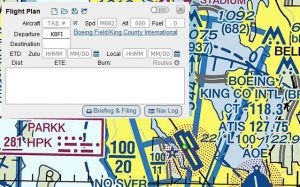
Failing To Plan Is Successfully Failing
Proper Planning Is Worth the Effort
As a kid I took a large interest in fishing, particularly in the preparation. I would meticulously organize my tackle box, scour stores for different equipment, and read up on the latest tips and tricks. By the time I was actually lakeside I would spend less than 30 minutes fishing because…well, honestly I found fishing to be incredibly boring. After a year or so of doing this I finally admitted to myself that I didn’t enjoy the act of fishing; rather, I enjoyed the preparation and organization.
The cathartic feeling I gained while preparing to go fishing found a new gateway when I became a pilot. In particular, flight planning. I learned to love flight planning’s variables and seemingly endless number of ways to obtain, organize, and prepare the information before it was wheels up time. However, as a flight instructor I came to the realization there aren’t a lot of people who share my sentiment for flight planning. For many it is a necessity to go fly and sadly, for a select few it’s non-existent.
 We’ve all been there as student pilots on the day of our first cross country. You thought you had the navigation log ready to go until you realize calculating your groundspeed with the newest winds is creating a time crunch. You forgot to check NOTAMs and now it’s ten minutes past your scheduled launch time. You’re also noticing a little disappointment in your instructor as well. The “hurry up and wait” mentality that most of us share is suddenly missing the “wait”. It’s only natural this experience tends to jade our perception of flight planning. So how do we better prepare for a flight and not feel rushed? The answer, which may not be what you want to hear, is practice and time.
We’ve all been there as student pilots on the day of our first cross country. You thought you had the navigation log ready to go until you realize calculating your groundspeed with the newest winds is creating a time crunch. You forgot to check NOTAMs and now it’s ten minutes past your scheduled launch time. You’re also noticing a little disappointment in your instructor as well. The “hurry up and wait” mentality that most of us share is suddenly missing the “wait”. It’s only natural this experience tends to jade our perception of flight planning. So how do we better prepare for a flight and not feel rushed? The answer, which may not be what you want to hear, is practice and time.
As pilots, we can hardly imagine flying solo with just one lesson under our belts. We understand it takes several lessons to gain the competency and confidence necessary to fly alone. However, we tend to do one flight planning lesson with our instructors and get to it the day of our first cross country. Quite literally, we are planning an entire flight having practiced doing so just once, maybe twice. This may be a hard pill to swallow, but try preparing three or four flights that you may never even fly. Your first and second attempts will be tedious, just like your first pre-flight inspections, but you will find it easier and faster as you gain experience. By the fourth or fifth attempt you will be able to hammer out an entire navigation log, weather briefing, and contingency plan in an hour .
Having built confidence in your flight planning skills will allow you to make better use of your time before a flight. With that said, you still need to allow yourself time to handle any surprises and believe me there will be surprises. If you have a three hour flight ahead of you allow yourself a minimum of an hour just to update and review the flight planning alone. The rest of your preflight will still require its usual time. You can help yourself out by having most of your navigation log completed before the day of the flight. Things such as your waypoint selections, true course, and airport information aren’t likely to change overnight. Even if it does, allowing yourself the time to accommodate those changes will reduce stress. Time is your friend if you make room for it. Failing to do so only adds to your stress level and it will inevitably carry through into the flight itself. What’s worse is this can contribute to the error chain, allowing mistakes to sneak through and leading you down a potentially unsafe path. Practice and time. It may be painful to concede to, but it will always pay off.
 Flight planning has been made easier over the past decade as EFBs become the norm along with apps that can accurately calculate groundspeed, fuel burn, etc. at the push of a button. For many of you that find the flight planning process a hurdle, this technology is welcomed with open arms. However, be cautious. While this technology can free you of some busy work, it can also remove you from being intimately familiar with the details of your flight. Once again, that ugly word “time” pops up. Allowing yourself enough of it to review the electronic flight planning can help prevent errors sneaking through and ultimately make the flight a pleasant experience, not a stressful one.
Flight planning has been made easier over the past decade as EFBs become the norm along with apps that can accurately calculate groundspeed, fuel burn, etc. at the push of a button. For many of you that find the flight planning process a hurdle, this technology is welcomed with open arms. However, be cautious. While this technology can free you of some busy work, it can also remove you from being intimately familiar with the details of your flight. Once again, that ugly word “time” pops up. Allowing yourself enough of it to review the electronic flight planning can help prevent errors sneaking through and ultimately make the flight a pleasant experience, not a stressful one.